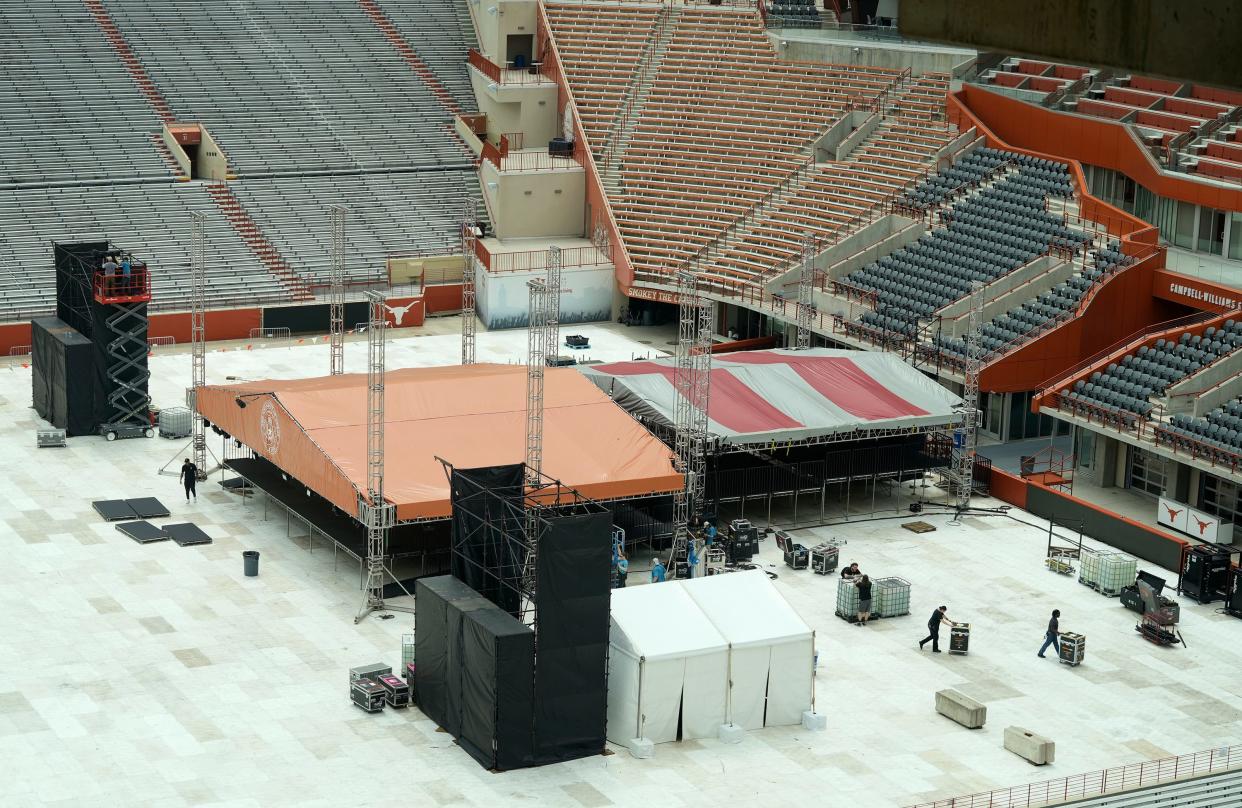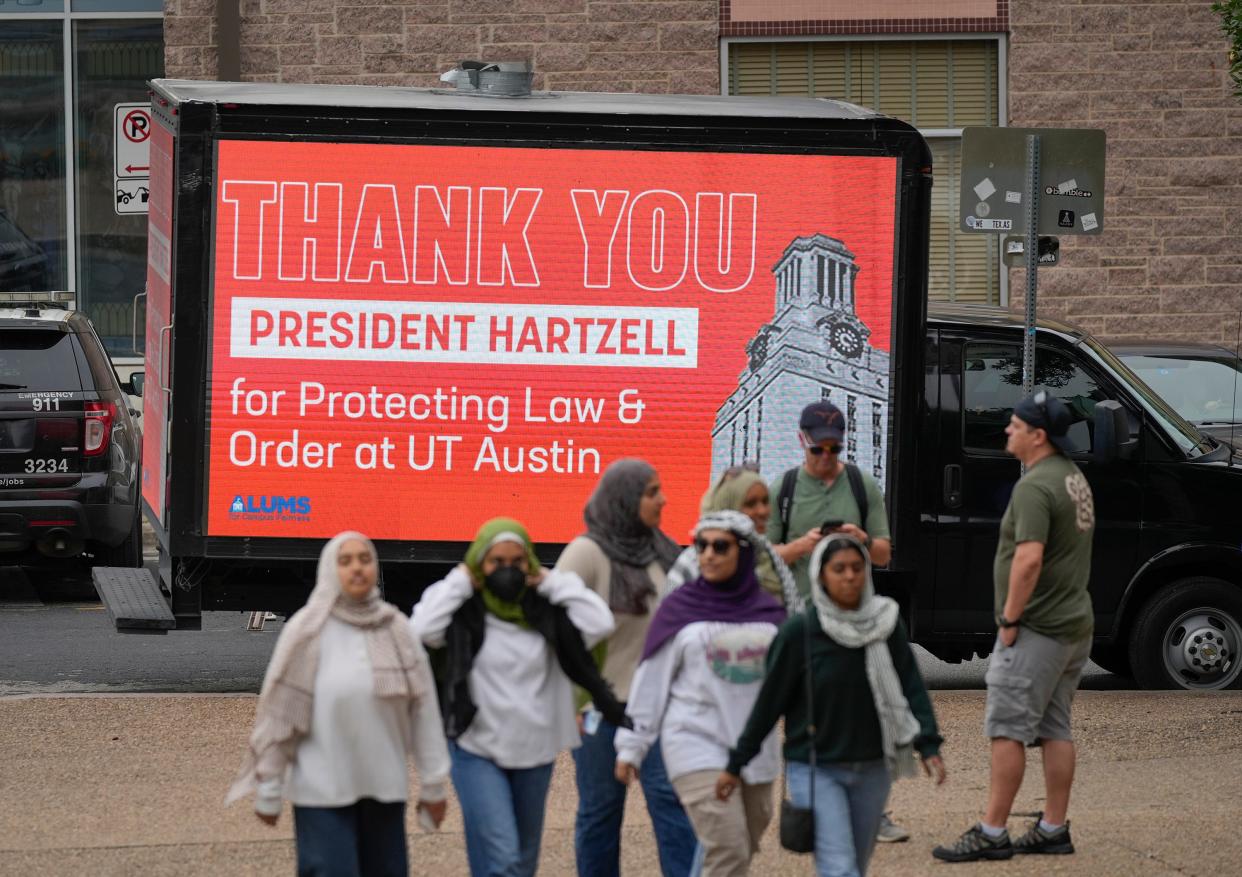UT graduates describe 'hectic' end to year after pro-Palestinian protests, DEI ban
An April 24 protest at the University of Texas, held in solidarity with others across the nation calling on their institutions to divest from weapons manufacturers contributing to the Israel-Hamas war, rocked the campus community after more than 50 people were arrested. Five days later, a surprise encampment set up on campus resulted in 79 more arrests on the same day UT had its last day of class.
Nationally, protesters have disrupted some university commencement ceremonies, and other schools have even canceled their graduation events. But at UT, the graduation ceremony on Saturday is still on.
Some graduating UT seniors told the American-Statesman it's peculiar to finish school at a time when political activism at the campus in Austin has garnered national attention and significant police response. But, they said, they also look back fondly at the community they've found at UT, and many are thinking differently about the upcoming commencement celebration.
James O'Brien, a graduating senior in history and philosophy of law, was arrested April 24 at the South Mall, he said. He did not expect there to be arrests at that protest.
"I was a couple weeks away from graduation; I was really trying to avoid risky situations like that," O'Brien said. "I figured that so long as I didn't do anything wrong, that nothing would happen to me. And I stood there; I didn't do anything wrong."

While he was sitting in his cell in the Travis County Jail, O'Brien worried he had ruined what he had been working toward the last four years. When he got out of jail, O'Brien's criminal trespassing charge — as well as those of the other 56 people arrested — was dropped and he worked with his professors to finish his finals. But he said he lost confidence in UT President Jay Hartzell, no longer felt safe on campus and didn't feel excited about graduation.
"It's difficult to be excited to graduate from an institution that within the last couple of weeks, the president of the institution has denounced a movement I believe in as one that is trying to disrupt and trying to generate hate on campus rather than one that's trying to seek positive change," O'Brien said.
'Hectic' end to year at UT
O'Brien said he will not risk protesting again, but he expects there will likely be police at the UT graduation ceremony in case others plan to do so.
Hartzell told the Statesman in an interview Thursday that he is excited for graduation. He said that especially because many students who are finishing school did not have a traditional high school graduation due to the COVID-19 pandemic, "I think we owe it to them and their families and their friends to really do what we can to make it special."
"We have a plan, and at the same time students, or anybody — outsiders — will hopefully realize that we're not going to allow it to be interrupted," Hartzell said of possible protests disrupting the commencement ceremony. "If it happens, it happens, and we'll deal with it and let the ceremony go on and get back to the good stuff."
Gil Blyakhman, a graduating senior in economics with a minor in Middle Eastern studies, came to UT because of its large Jewish community, something he didn't have at his Dallas high school. At UT, he joined Sigma Alpha Mu, Texas Hillel and Chabad as well as co-chaired the Israel Block Party.
Blyakhman said finishing school during this time has been "hectic."
"When I was walking to the library, or to another building on campus, and had to walk across a group of people chanting for the destruction of the country where I was born, that was definitely not a good experience," Blyakhman said, "but I tried my hardest to just set that aside and study."
He split his time amid the protests studying and gathering with other Jewish students. He said since some students in the Northeast didn't have a high school graduation because of the pandemic or a commencement ceremony this year because of protests, he's grateful to be in Texas, where it looks like he'll be able to have had both.
If there are protests, which he thinks there will be, he said, "I'm not going to let it impact my graduation."
"I'm just there to be with my family and to celebrate my accomplishment," Blyakhman said.

For other students, the upcoming commencement has changed their perspective on graduation in general.
Alex George, a UT graduating senior in the Plan II Honors Program in history, said that because of the COVID-19 pandemic, it took him a while to build community on campus. But this year, as George completed his final exams while protests were happening outside, he said he felt that power of community. He felt inspired.
"Coming from freshman year, not setting foot on campus, not seeing people in the UT community, to end of senior year, seeing people banding together putting things on the line, it's a very hopeful note to go out on," George said.
When asked if he's worried protests will disrupt the graduation ceremony, he said he's not, unless the "the university decides to make it a disruption." To him, the protests seem more important than finals: They remind him that there's something bigger after UT.
"There's kind of that aimlessness of graduation ... you lose these systems and these value systems that gave your life meaning for four years of assignments and professors," George added. "But to see and know there are still things and values that exist outside of this institution, that there are people standing up for that kind of thing, it makes you feel better about leaving the university."
College experience marked by activism
Sheridan Ray, a graduating senior in sustainability studies with a minor in media studies, took her graduation pictures in the early morning Monday to avoid the chance of a protest interrupting them. She said preparing for this graduation feels like "deja vu" from the way COVID-19 affected her last one.
As a young Black female, she said she feels a responsibility to support other movements bringing attention to injustice as having solidarity during the Black Lives Matter movement was important to her. She feels excited for graduation, but she said it feels odd celebrating amid the Israel-Hamas war, which has reportedly left more than 34,000 dead in Gaza.
"I'm still excited, I still feel like I owe it to myself to still celebrate, but I still also want to give acknowledgement to the people who are suffering in Palestine," Ray said.
Corinne Floyd, a UT senior in the Plan II honors program and president of the Senate of College Councils who is graduating in advanced human development and family sciences with a minor in African and African diaspora studies, said her class's experience has been marked by moments of struggle and activism after decisions by the university's administration and the Legislature.
On April 2, she saw her mentors at the Division of Campus and Community Engagement, formerly the Division of Diversity and Community Engagement, lose their jobs in a sudden reorganization due to Senate Bill 17, a state law that went into effect in January and banned diversity, equity and inclusion offices at Texas public universities. She watched the Multicultural Engagement Center close in January.
"For us as students, we came in with the organizing around George Floyd the summer of 2020 before we started, and then it was the 'Eyes of Texas,' and then it was DEI," Floyd said. "These huge challenges that we've gone through as a student body, specifically within Black UT."
Now, Floyd is interested in examining education policy outside of UT. She feels a bit guilty for leaving with her institutional knowledge, she said, but hopes the students will be able to continue her class's persistence and grit in the face of difficulties.
"I've always been proud to be a Longhorn because of the people and the way we rally around each other," Floyd said. "What I'm really hopeful for is that this momentum carries, and we continue to see students to engage in their right to peacefully protest ... and start to intentionally take this campus back for the student body."
Rules for UT's graduation on Saturday
UT's commencement will be held Saturday evening at Darrell K Royal-Texas Memorial Stadium. No tickets are required for people to attend, though a ticket is needed for graduates.
According to the commencement rules, no artificial noisemakers, flags, signs, banners or flag poles are allowed. Every bag will be checked, and bags over 4.5 by 6.5 inches must be clear. Demonstrations outside the stadium that block passageways or disturb the ceremony will not be permitted.
More: UT-Austin's commencement is Saturday. See road closures, parking and prohibited items
When Hartzell was asked what he would tell people who are unhappy with the university or don't have confidence in him right now, he said he hopes graduation is a time to unify.
"It's a really special moment and it's bigger in some ways than any one experience that has happened in the last few weeks or months," Hartzell said. "Students so often are the higher ground in what we do, and I think the chance to see students graduate will hopefully be a uniting moment for campus and for higher ed across the country."
This article originally appeared on Austin American-Statesman: UT seniors reflect on graduating amid pro-Palestinian protests, DEI ban
